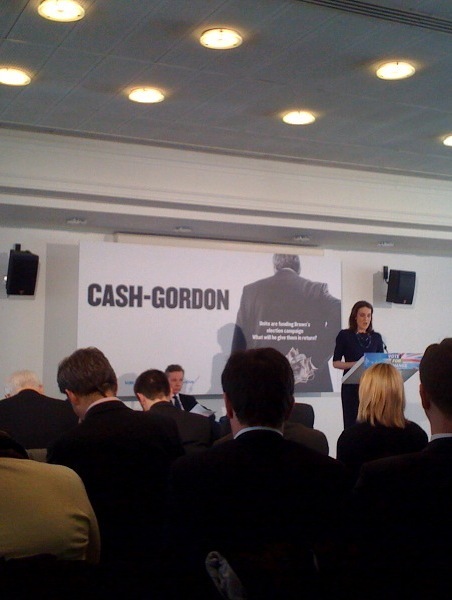 So, the Tories have declared war on Charlie Whelan and Unite – what Eric Pickles calls the “great untold story of British politics”. He was joined by no less than two more shadow frontbenchers – Michael Gove and Theresa Villiers – at a briefing attacking the union’s political influence this morning. And that’s not all: the Tories have produced a document detailing how Unite is funding Labour and opposing reform, and there’s even a new digital poster campaign to go along with it. The gloves are well and truly off.
So, the Tories have declared war on Charlie Whelan and Unite – what Eric Pickles calls the “great untold story of British politics”. He was joined by no less than two more shadow frontbenchers – Michael Gove and Theresa Villiers – at a briefing attacking the union’s political influence this morning. And that’s not all: the Tories have produced a document detailing how Unite is funding Labour and opposing reform, and there’s even a new digital poster campaign to go along with it. The gloves are well and truly off.
As for what the shadow ministers actually said, Villiers highlighted Unite’s role in the BA troubles, while Gove gave a speech which argued that Brown’s Labour Party “bears only the most superficial resemblance to the Labour Party that swept to power in 1997.” There were passages outlining Unite’s heavy presence in both Labour’s funding rolls and their candidate lists. And an entire section devoted to the creeping influence of Whelan, whose “distinctive fingerprints can be detected all over Labour’s recent lurch to the left in key policy areas.” Somewhere in there, there was the question that the Tories hope will resonate: “How can we trust what Gordon Brown says … when we know he is in hock to Unite and in thrall to Charlie Whelan”.
It’s all quite punchy stuff. And it’s certainly important that the limelight is shone, meltingly hot, on Whelan & Co. But – as I’ve said before – for the Tories to do this at this stage of the electoral cycle carries a distinct risk with it: that a disillusioned public sees all this as too wearily Westminster-centric; that voters would prefer to hear about the everyday issues which really matter to them. To my mind, that’s probably what happened in the case of Labour’s campaign against Lord Ashcroft.
As it happens, I think this morning’s triple-concentrated attack on Unite probably got the balance right. The Tories have launched their blitzkreig. Now they need to concentrate their forces elsewhere.
P.S. Here’s the campaign poster:







Comments